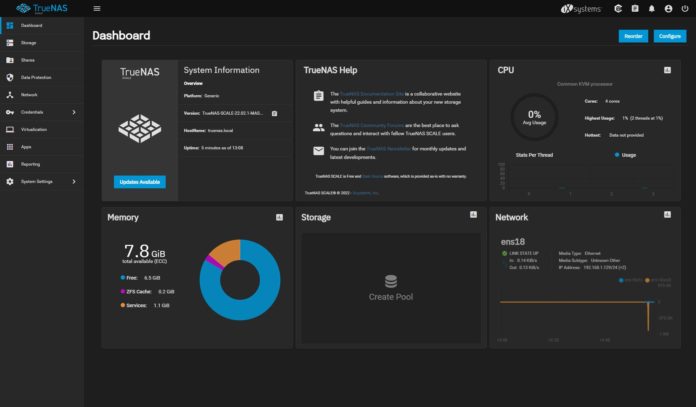©2021 Reporters Post24. All Rights Reserved.
This is the release we have been waiting for. Today, TrueNAS Scale has finally hit release. We are just going to quickly discuss some of the big points but will have more content on STH for the release at a later date. We wanted to get into the release a bit, but then give a perspective on this going forward. We know our readers will likely test Scale, but wait to deploy, and that is reasonable at this juncture. Still, there is a roadmap so we need to also look at where this is going.
TrueNAS Scale 22.02 Released
First off, let us start with what is TrueNAS Scale, and where are we in the process. TrueNAS Scale is based on Linux instead of FreeBSD like TrueNAS. We get all of the storage features we would expect in a modern solution like snapshotting, replication, iSCSI, SMB, NFS, and S3-compatible object storage. It then layers new features and Linux features on top of that new base like KVM for virtualization, Kubernetes support, and a Gluster-based scale-out storage solution. Gluster is run across ZFS and that allows for having many benefits of ZFS like built-in compression, snapshotting, and data integrity with the scale-out multi-chassis support of Gluster.
Today marks the Angelfish release for TrueNAS Scale 22.02. This is the release that is stable enough to really start using.
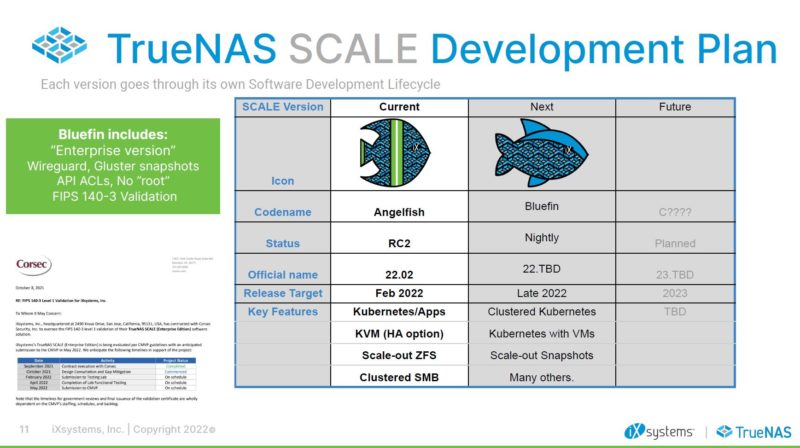
Next comes the future updates, and versions. iXsystems says TrueNAS Scale after a few updates should be ready for more critical deployments. Also, there are a lot of features like Gluster-wide snapshotting, FIPS 140-3, Wireguard, and more that are coming with the Bluefin version later this year.
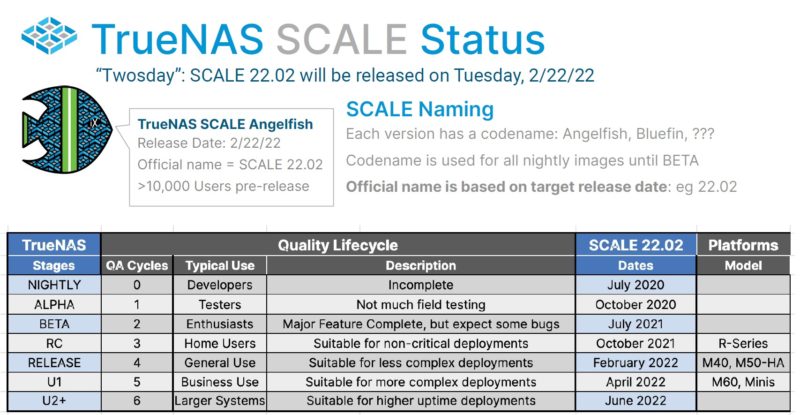
A quick note here is that iXsystems is not discontinuing TrueNAS (non-Scale.) Instead, that will go to TrueNAS 13 in the near future as the company’s scale-up solution. Bascially, without directly putting it on the slide they are saying if you want reliable storage, continue to use TrueNAS for now. At some point in the future, we can see iXsystems doing another rationalization effort and migrating customers to TrueNAS Scale, but that is likely not a 2022 or probably a 2023 activity. One will also have the option of using TrueNAS Scale nodes for application hosting and TrueNAS classic for storage, basically replacing VMware, Red Hat, Nutanix, Microsoft, or other VM hosting platforms with Scale.
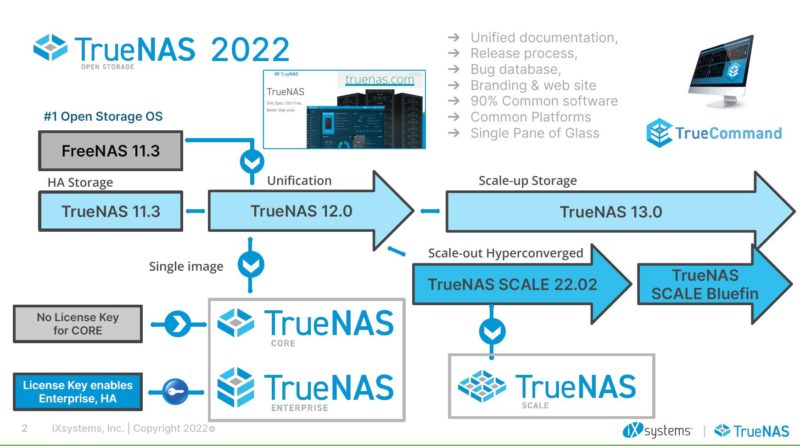
Logging in, if you have used a recent TrueNAS installation, Scale will look very familiar. If you are still using an ancient FreeNAS version, then this will feel much more modern.
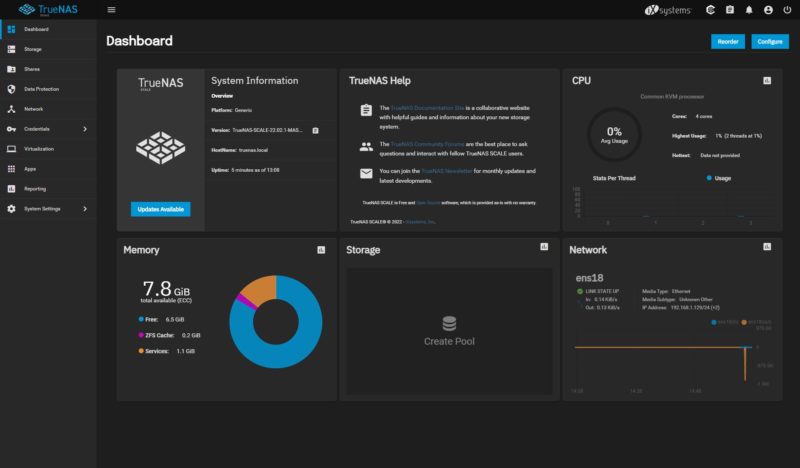
At the heart of TrueNAS Scale, it is still a storage-led appliance. After basic permissions and networking is setup, the next step is that you need to create a pool. This is similar to how you would interact with a QNAP or Synology NAS, also NAS-led solutions, but is a bit different than VMware, Proxmox VE, and others. As a simple example, with Proxmox VE, you can install root onto a mirrored ZFS array and then run VMs directly from that (or even a single disk.) With TrueNAS Scale, you start with a storage pool.
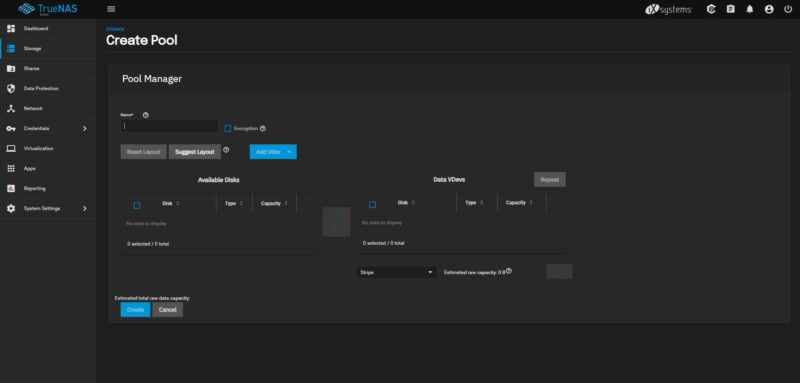
The big features aside from the scale-out are the KVM virtual machine and containers. KVM is probably the #1 hypervisor by a long shot since it is used by major cloud platforms. TrueNAS Scale has a GUI for it, although the layout is very vertically focused.
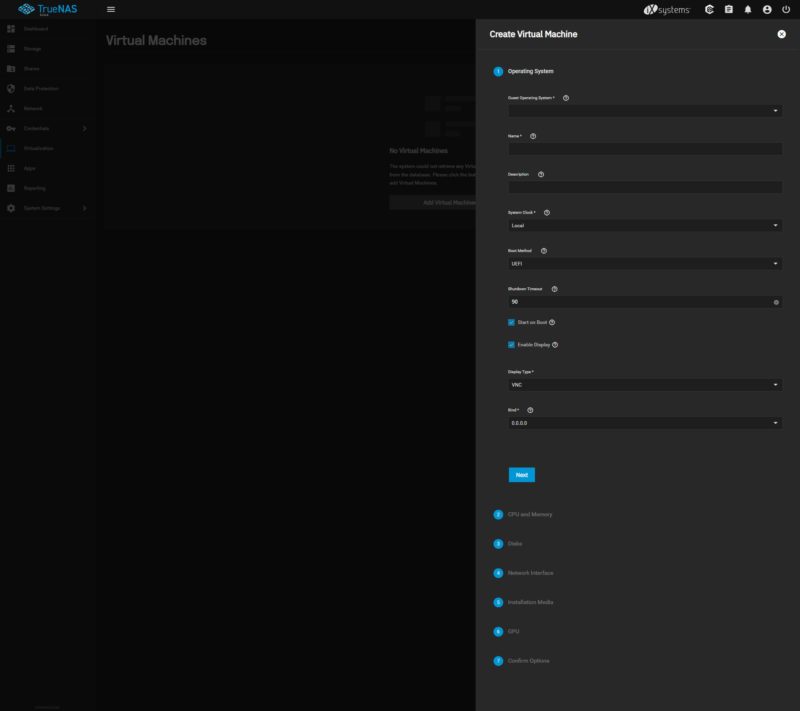
Likewise, one can setup Kubernetes and start running containers.
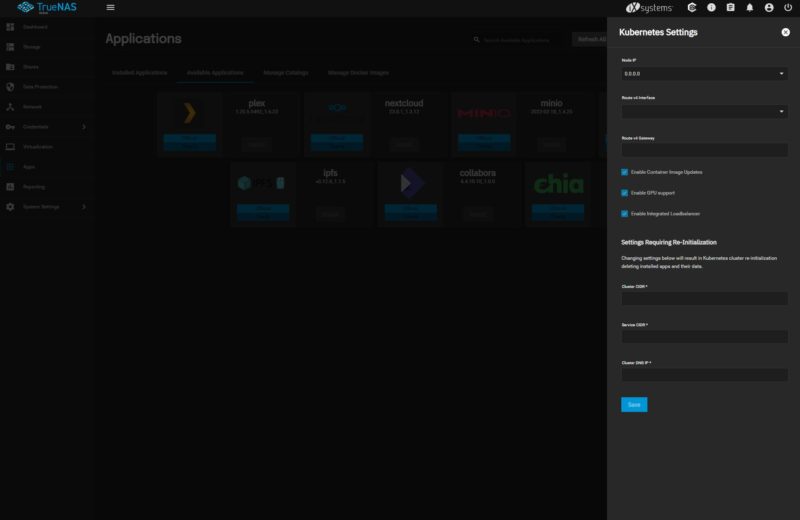
TrueNAS Scale also has an application catalog that one can use to install apps easily, similar to what you would see on a QNAP or Synology.
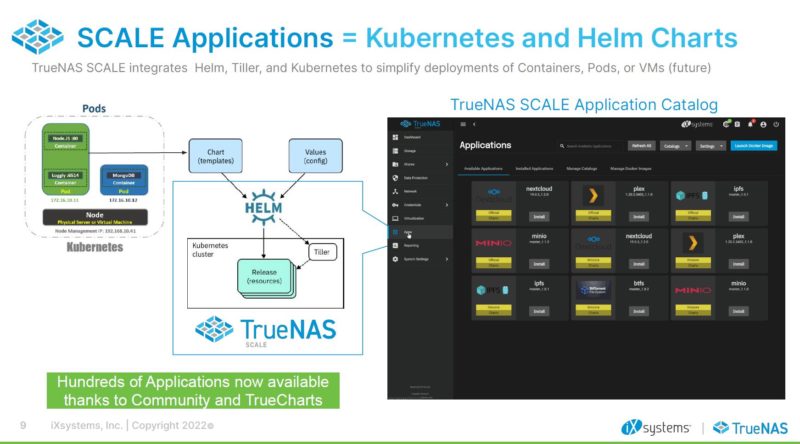
The trick with all of this, of course, is the scale-out capability. By building on Gluster, one can have storage available to many nodes. This allows migration of workloads to happen across a cluster and iXsystems can have container and VM storage on Gluster. That also means that adding more compute, memory, and storage can happen simply by adding additional nodes.
TrueNAS Scale v. Proxmox VE
After having played with TrueNAS Scale during development and down to the release date, and also having used Proxmox VE since 2013 (we ran STH on Proxmox VE in 2013 in our first little colocation installation) I think I have a perspective on the two.
The two solutions may seem similar, but they are actually quite different. TrueNAS Scale feels like TrueNAS Core, but with better virtualization and Kubernetes support. It feels like it grew up as a NAS and then added features more in-line with some of what Synology and QNAP offer, with a critical difference: there is the promise of scale-out using Gluster and ZFS. Proxmox VE feels more like a team that wanted to displace VMware directly. Under the hood, Proxmox VE also feels very much like Debian Linux, you can apt install packages for example. For now, it is really the difference between roots in a NAS environment or a virtualization environment.
With this release, as mentioned earlier, TrueNAS Scale is OK for smaller installations, but higher-end installations are still a few months away. Proxmox VE we have had 100 physical node clusters running in the lab, and have had those for years. We also have a number of production and lab clusters set up.
One of those Proxmox VE clusters, a small lab cluster running Ceph on all HPE ProLiant machines just failed due to multiple failures in the servers. We were going to have the story of that one in January but it keeps getting pushed out. Even with that, and having had clusters fail before, updating clusters (a bit more involved with Ceph), and so forth, Proxmox VE is still our recommendation if you needed a SMB VMware alternative today. You can purchase relatively inexpensive support and everything works.
That is today. Where TrueNAS Scale is headed is a converged scale-out infrastructure with a single pane of glass management in TrueCommand. Two years from now, if Proxmox VE does not up its game on storage management via the GUI (one can do everything with the CLI, and it has been adding features to the GUI slowly) then the default recommendation will be TrueNAS Scale instead.
Final Words
Last week I dug out an old discussion document from September 2016 where I headed over to iXsystems and voiced that they needed a scale-out hyper-converged (then FreeNAS) option to take on Proxmox VE. It has taken a long time, but TrueNAS Scale is the answer.
What is really cool here, is that iXsystems is about a year away from an endgame-type product for those in the SMB market. There are so many SMB/ SME customers that use Red Hat/ VMware and spend a ton on it just to do some simple virtualization or container orchestration. For those companies that also spend large amounts on storage, only to have to make huge up-front investments in capacity, scale-out allows compute, memory, and storage to be added over time in smaller chunks.
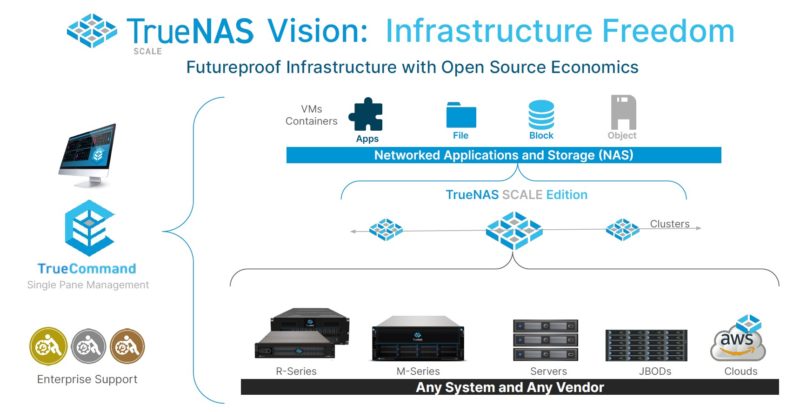
As much as I think the Proxmox team should be nervous about TrueNAS Scale, QNAP, Synology, and VMware may need to be doubly nervous. QNAP and Synology should have had a great cluster solution out by now, but have not. Synology’s hardware is at a huge premium and is usually limited to older hardware. QNAP has more modern hardware. Both will come under a lot of pressure with a TrueNAS Scale solution that can run on a wide array of hardware and can both scale up and out. Paying vast sums of money for Red Hat/ VMware solutions once this matures is going to seem fool-ish at current pricing.
Make no mistake, this is a huge release in the world of SMB IT, even if it takes some time to propagate and mature. We are extraordinarily excited about TrueNAS Scale at STH and will be using it more in the coming months.
Source: www.servethehome.com


